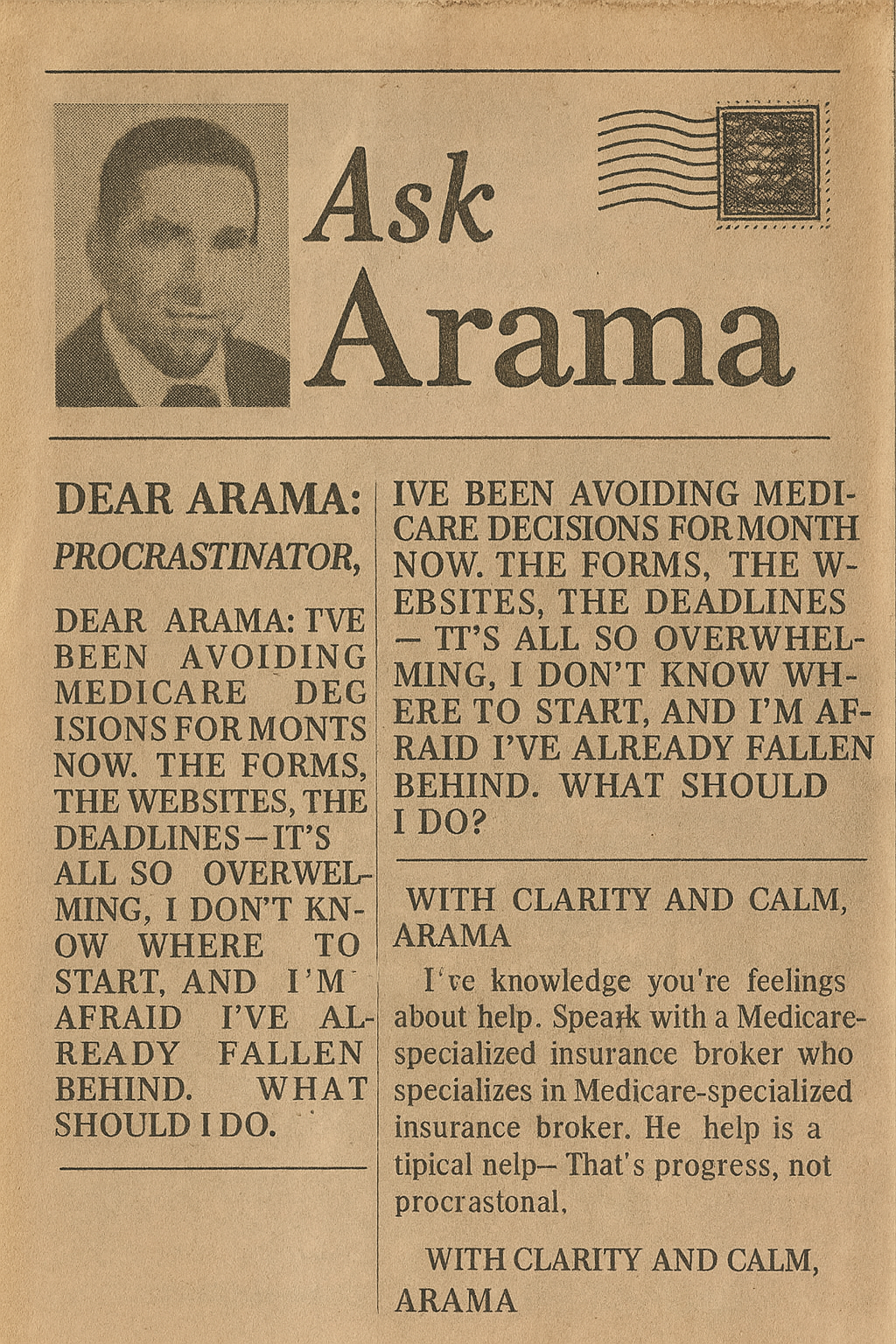Today, I found myself reminiscing about the classic advice columns from the '80s—think Dear Abby. (If you're under 40, just hang in there with me for a moment—this'll make sense soon, I promise.)
Yes, I’m definitely old enough to remember those days!
So, I figured—why not write this blog in that same nostalgic style?
And again, if you're under 40, stay with me—this format has some timeless charm
DEAR ARAMA: I'll be honest: I’m a procrastinator. If something feels even slightly complicated—especially anything to do with forms, insurance, or deadlines—I tend to put it off. So when I got close to turning 65 and knew I’d need to figure out my health insurance, I did what I always do: nothing.
I told myself I’d get around to it. Eventually. But the truth is, this kind of stuff doesn’t wait.
Here’s what I learned the hard way—and I would appreciate any feedback on what I could have done differently.
I Assumed My Job’s Insurance Would Just Keep Going
I was still working when I turned 65 and figured I didn’t need to do anything. Boy was I wrong! Although I had insurance through my job, I didn’t realize that once you hit 65, Medicare becomes part of the picture, even if you’re still employed.
There are rules and deadlines—and not paying attention can lead to gaps in coverage or lifelong penalties.
I Kept Putting It Off Because It Felt Overwhelming
I’d heard terms like “COBRA,” “Part B,” and “Special Enrollment,” but every time I looked them up, it felt like I was reading a different language. So I just… didn’t. I ignored it, hoping it would all make sense eventually.
The turning point? I finally talked to someone who understood the process and could walk me through it in plain English.
COBRA Seemed Like a Safety Net—Until I Saw the Price
When I left my job, I received a COBRA letter saying I could keep my company insurance for a while. That felt like a relief—until I saw the monthly cost. Without my employer’s help, it was unaffordable.
That’s when I started taking a closer look at Medicare—and realized it might be a better long-term option for both coverage and cost.
The Medicare Timeline Caught Me Off Guard
I assumed I could sign up for Medicare whenever I wanted. But there’s actually a specific enrollment window around your 65th birthday. Miss it, and you might face late enrollment penalties or a delay before your coverage begins.
That was news to me. And it was stressful. What should I have done differently??? ---Proscrastinator
Dear Procrastinator,
First—take a deep breath. Congratulations on navigating one of the most confusing parts of retirement. Medicare confuses even the most organized folks, and putting it off is more common than you might think.
Here’s the good news: You didn't attempt to navigate it alone. An error in Medicare enrollment or a Late Enrollment Penalty can cost you thousands!!
One of the most helpful things you did was speak with a licensed insurance broker, who specializes in Medicare. These professionals know the system inside and out—and best of all, their guidance is typically free.
A good broker can:
· Explain the difference between Medicare and COBRA (without the alphabet soup).
· Explain the differences between a MediGap plan and Medicare Advantage
· Help you avoid common (and costly) mistakes.
· Keep you on track with deadlines and paperwork.
· Shop around multiple companies and help you enroll based on your unique circumstances.
· Break down what matters based on your specific situation.
What you should have done sooner:
· Started learning about Medicare before turning 65.
· Realized I didn’t need to be an expert—just needed someone who was.
· Look for someone who has experience with employee benefits, insurance and the increasing cost of healthcare.
Final Thoughts
If you’re turning 65 and you haven’t figured out your health coverage yet, it’s okay. You’re not behind—you just need to take the first step. Start by talking to someone who knows the system and can help you sort through your options.
No pressure, no perfect timing—just progress. And that’s really all you need.
Regards,
ARAMA

